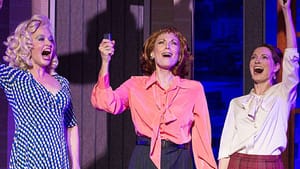Stay in the Loop
BSR publishes on a weekly schedule, with an email newsletter every Wednesday and Thursday morning. There’s no paywall, and subscribing is always free.
The funny side of feminism
Dolly Parton’s ‘9 to 5’ at the Walnut (second review)

Recently Emma Watson, the beloved Hermione of the Harry Potter movies, gave a talk at the UN on why she is a feminist. Patricia Resnick’s musical version of the 1980 film 9 to 5, currently on stage at the Walnut Street Theatre, about three secretaries who take their boss hostage and make the office a better, more productive place, gives us a similar message, along with two hours of jokes and tunes and laughter.
But is this story, which is set in the early days of the second wave of feminism, still relevant today? Haven’t we moved beyond issues like women fighting for equal pay for equal work or wanting to be taken seriously even if they happen to be blonde and buxom? Haven’t men gone beyond being “sexist, egotistical, lying, hypocritical bigots”? The simple answer is No; though there are good guys and successful women, the issues still remain. And I’m not even referring to the NFL and its problems in this context, because it’s a bigger and much more subtle problem.
When Doralee Rhodes, played delightfully by Amy Bodnar as a softer Dolly Parton, is asked to climb a ladder to find some documents so the men in the office can admire her assets, it is eerily similar to seeing Sofía Vergara on a rotating pedestal at this year’s Emmys while Academy of Television Arts and Sciences's CEO Bruce Rosenblum talked about something serious and the audience got to admire her. . .assets.
Same old choices
The three secretaries are reflections of some life choices that women still make today, and their marijuana-fueled dreams of revenge still reflect stereotypes of women’s power. Judy (Amanda Rose), whose husband ditched her for a 19-year-old, sees herself as a vamp in a red dress seducing her prey and then threatening to put a “stiletto in your heart.” Doralee, who wants to be taken seriously, becomes an Annie Oakley sharpshooter in a dress, lassoing her man, and Violet (Dee Hoty), a working mother who needs her job to care for her son, turns into a fairytale princess offering poison — women’s weapon of choice — to her victim.
Even though this is a story about women’s inadvertent rise to power by finally standing up for themselves, the biggest laughs come from bathroom humor — an opening number erection, the threat of castration (“I’ll turn this cock into a hen”), and an implied sexual act with the framed picture of the boss. And when stern, frumpy, oversexed Roz, played by the talented Mary Martello, turns glamorous, she lets down her hair, a la old clichés about sexy secretaries, and shows her boobs, the modern twist on that old cliché.
The side story about a younger man (Joe, played by Philly favorite Ben Dibble) interested in older woman Violet, implies that women can have it all, even later in life, although the ending that reveals what happens to everyone in the future casts Judy as the perpetual single woman who lives alone and likes it.
The nature of ambition
It is interesting to compare this show to last season’s How to Succeed in Business Without Really Trying, also at the Walnut. Both approach their subjects with equal humor, but in How to Succeed, the hero, J. Pierrepont Finch, schemes his way to the top of the company with intentional glee, while in 9 to 5 the women redecorate the office in pastels, provide daycare and compassionate leave, and stumble their way into power quite by accident. Violet’s desire to be “One of the Boys” notwithstanding, her actions are not intentionally geared toward success; she couldn’t even imagine such a thing as a woman CEO until it is bestowed upon her by the man with real power, the chairman of the board.
So, is this show still relevant today? Yes, it is. And fun too. It has songs by Dolly Parton, who knows how to write tunes that we can actually hum as we leave the theater, including “9 to 5” and “Backwoods Barbie.” What we don’t get is anything that could be used as a feminist anthem, although “I Just Might” has a few lines, such as “I just might be stronger than I know,” that reflect concepts with which many women still struggle.
For Steve Cohen’s review of 9 to 5, click here.
What, When, Where
9 to 5: The Musical. Music and lyrics by Dolly Parton; book by Patricia Resnick. Bruce Lumpkin directed. Through October 19, 2014 at Walnut Street Theatre, 825 Walnut St., Philadelphia. 215-574-3550 or www.walnutstreettheatre.org.
Sign up for our newsletter
All of the week's new articles, all in one place. Sign up for the free weekly BSR newsletters, and don't miss a conversation.

 Naomi Orwin
Naomi Orwin